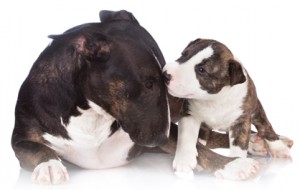It’s Not About The Bitch – Breeding A Litter In A Complex World
Click here to read the complete article
226 – November/December, 2014
By Peri Norman
Theories abound about how humans and dogs became such an integral part of each other’s lives. According to the experts, Canis familiaris was domesticated somewhere between 33,000 and 15,000 years ago. DNA evidence supports the belief that our vast array of modern breeds of dogs are all descended from the grey wolf, and additionally, that it is highly likely that “domestication” took place more or less spontaneously in multiple locations in the world. Just how that happened, we may never know for sure. Some have surmised that dogs basically “self-domesticated”. That is the ones with a higher tolerance for human proximity were self-selecting as they scavenged the garbage from camps and villages and consequently produced generations of animals that became more and more habituated to humans. Others tell more fanciful stories about humans bringing home orphaned wolf pups and raising them with the children. The more biddable descendents of these orphans eventually became domesticated dogs. My personal favorite theory is one proposed by the excellent book “A Wolf in the Parlor” by Jon Franklin. In essence, Franklin takes a whole book to discover that dogs and humans have a symbiotic and mutually beneficial relationship… pretty much from the beginning of our relationship and throughout our cojoined evolution. Franklin says, “If Canis familiaris now needed the human, the human was equally dependent on the dog. Humans don’t just like dogs, we cannot do without them. They are our only touchstone to an emotional past we have forever lost, and yet desperately need.” Yup. That pretty much covers it for me.
Jumping ahead a few tens of thousands of years to 1824, a momentous occurrence took place in England. The Society for Prevention of Cruelty to Animals was formed. In the late 1800s several similar organizations were founded in the United States, but in 1877, the American Humane Association was formed to be “America’s voice for the protection of children and animals.” Over the course of relatively recent times, a couple of hundred years or so, numerous animal welfare organizations have sprung up wielding their various banners regarding their proposals about appropriate care of our animals. Somehow, in the 1960s things went terribly awry. Rod and Patti Strand’s ground-breaking and still relevant work “The Hijacking of the Humane Movement: Animal Extremism” takes us on the terrifying journey from the concept of humane treatment of animals to a graphic portrayal of the tactics and terror of the various front organizations involved in the Animal Rights movement. Somewhere along the road where our society fell into this looking glass, dog breeders went from being respected members of the community and experts on all things canine to being vilified, bullied and ridiculously over-regulated. I can still remember the profusion of feelings that rushed over my mind and body as I was walking through the mall and spied a gal in a T-shirt that read “Save a dog. Euthanize a breeder.” How in the world did we end up here?
Sadly, we are here. And we must acknowledge our history and our current situation to move forward in an ethical fashion. So in the spirit of mutual respect and discussion, I would like to share with you my thoughts on the mundane, or highly controversial, question of whether or not you should breed your bitch.
Evaluate the quality. No, it’s not about evaluating the quality of your bitch. It is not about how many dog shows she has attended, how many herding trials she has won or how many Q’s she collected. Instead, evaluate honestly the quality of the knowledge that you have accumulated. Do you have a background of experience that will lead you to a successful and honest evaluation of your bitch’s strengths and weakness? How often have we heard that your dog should have a title on both ends? We know that great variation exists in the amount of time, energy and money required to attain various titles. We also know that some humans are more competent in some areas than others. The results of the various competitions do not change the intrinsic quality of the dog. At best, they give us clues about the activities that a particular handler/trainer and dog can accomplish together. This is not a pass on competing with your dog, but an admonition to look beyond the “results” to the “real” information provided by the challenges of competition. Training and trialing your dog deepens your relationship. It teaches you things about your dog that you will not learn in the show ring or sitting on the sofa. Working dogs will teach about innate drives, resilience, focus and biddability, among other things. Your knowledge and perspective on canine temperament will increase exponentially the more demanding activities you and your dog undertake.
Evaluate the feedback. Do you have the honest input of one or more mentors whose insight, knowledge and thought processes you can rely on? Do you have a breeding partner or close friend who can serve as a sounding board for everything from picking a stud dog to matching puppies to their new homes? Two heads are better than one, in many cases. Trusted trainers, knowledgeable friends and mentors help us to refine our outlook and clarify our goals. Our dogs are a life-long opportunity to continue to learn and grow. New research is giving us enormous amounts of information about the training and behavior of our dogs, safeguarding our gene pools and managing canine genetic disease. Our dogs deserve our very best efforts. That includes making knowledgeable and caring decisions about our own animals and the health and welfare of our entire breed. To do this, we must be open to perspectives other than our own and constantly work on assimilation and implementation of tremendous amounts of new information.
Evaluate the commitment. Yes, yours. Breeding a bitch is a huge commitment, firstly to the health and happiness of your bitch. Often, breeding and whelping goes smoothly. We love all the pictures of a contented bitch and healthy pups in a pristine whelping box. But there are a myriad of things that can and do go wrong. A strong commitment to the appropriate care and feeding of a breeding bitch is crucial to the health and welfare of the pups and the bitch. A strong working relationship with a kind and competent veterinarian is a critical component to success. An excellent veterinary clinician can help you proactively care for the unique needs of a pregnant and nursing bitch and catch potential train wrecks before you and your bitch have been up all night and she’s facing major medical complications. Secondly, you need to be prepared to care for the pups. That commitment does not and cannot end at eight weeks with people happily carrying fat, happy puppies to the car, although that is certainly an excellent place to start. As responsible breeders, we must support our puppy people. We need to be available to answer their questions and sometimes, just to listen. It is important for us to track our pups as long as we possibly can. In an ideal world, we will be present and able to help our puppy people deal with the grief and pain that comes with the loss of a wonderful companion of many years. Lastly, we need to recognize the importance of having an unalterable commitment to our breed. We must get past the challenges that come with our differing opinions about breed type, our frustration with people who prioritize breeding criteria in ways other than we do, and we must avoid the concepts and negativity that come with taking competition too seriously. As owners, breeders, exhibitors and rescuers, we are all on the same team. Working together in support of our beloved breed will enhance everyone’s level of success and, most importantly, improve the health and welfare of the dogs.
Evaluate your resources. Plenty of people of rather modest means are excellent dog breeders. Those people plan carefully and utilize their resources wisely. That said, it is important to be sure that you have the capability of providing appropriate and good quality care to your bitch and her pups. A pre-breeding budget should include the following:
1. A routine veterinary check-up for the bitch as well as completion of any outstanding testing required by CHIC and a Brucellosis test.
2. Stud fee and transportation costs (insemination costs for chilled or frozen breedings)
3. Routine vet checks during pregnancy, including but not limited to ultrasounds, x-rays and necessary blood work.
4. Emergency funds for an unplanned c-section or treatment of whelping-related challenges like uterine inertia or eclampsia
5. Post-partum check-up and appropriate veterinary care for your bitch
6. Vaccinations and worming for pups (also dewclaws, ears and tail docking, registration and microchips, if appropriate)
7. Additional cost for extra food and supplies
There are human resources that will be required as well as financial ones. We have considered the importance of an excellent veterinarian. The same mentors who helped you to evaluate your level of knowledge will hopefully continue to lend their best thoughts as you go through the whelping and rearing of a litter. A list of well-screened and well-educated buyers should be compiled well before any breeding is undertaken. The most critical resource of all is your time. You simply cannot rush through the hugely demanding task of caring for, socializing and evaluating a litter of pups. Those tasks will lay the foundation for the entire lives of those pups. They need you to be present and dedicated to providing an excellent start in life. Your resources are a safety net for you and your bitch. Evaluate them thoroughly and honestly.
Breeding dogs is a wonderful endeavor. We should do more of it! Instead of worrying when John Q. Public wants to buy a dog from us and maybe breed it, we should reach out in positive fashion and educate people about responsible dog ownership and breeding. Our long history of shared evolution and companionship with our dogs requires their presence in our world not only for the “jobs” they perform, but for the emotional bond that ties our hearts together. Our recent history requires that we acknowledge the changing concerns of our increasingly urbanized and scrutinized society, and continue our relations with our dogs, particularly with regard to breeding, in the most respectful and responsible manner possible.
Short URL: http://caninechronicle.com/?p=64341
Comments are closed












